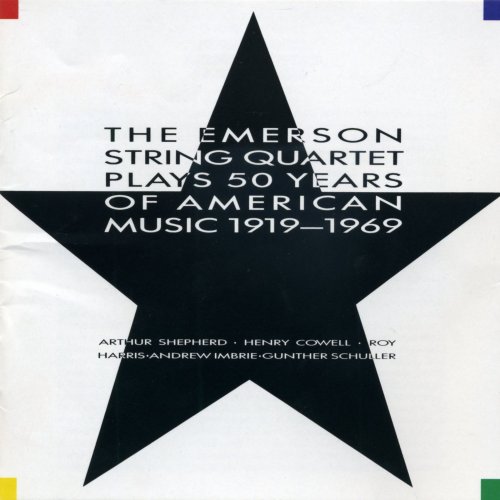
The Emerson String Quartet - Plays 50 Years of American Music 1919-1969 (2007)
BAND/ARTIST: The Emerson String Quartet
- Title: Plays 50 Years of American Music 1919-1969
- Year Of Release: 1978 (2007)
- Label: New World Records
- Genre: Classical
- Quality: FLAC (tracks)
- Total Time: 01:14:43
- Total Size: 363 Mb
- WebSite: Album Preview
Tracklist:
Quartet Euphometric
1. Henry Cowell – Quartet Euphometric
Triptych, For High Voice And String Quartet
2. Arthur Shepherd – He It Is
3. Arthur Shepherd – The Day Is No More
4. Arthur Shepherd – Light, My Light
Three Variations On A Theme (String Quartet No. 2)
5. Roy Harris – Variation I
6. Roy Harris – Variation II
7. Roy Harris – Variation III
String Quartet No. 2
8. Gunther Schuller – I
9. Gunther Schuller – II
10. Gunther Schuller – III
String Quartet No. 4
11. Andrew Imbrie – I
12. Andrew Imbrie – II
13. Andrew Imbrie – III
Performers:
Emerson String Quartet
Quartet Euphometric
1. Henry Cowell – Quartet Euphometric
Triptych, For High Voice And String Quartet
2. Arthur Shepherd – He It Is
3. Arthur Shepherd – The Day Is No More
4. Arthur Shepherd – Light, My Light
Three Variations On A Theme (String Quartet No. 2)
5. Roy Harris – Variation I
6. Roy Harris – Variation II
7. Roy Harris – Variation III
String Quartet No. 2
8. Gunther Schuller – I
9. Gunther Schuller – II
10. Gunther Schuller – III
String Quartet No. 4
11. Andrew Imbrie – I
12. Andrew Imbrie – II
13. Andrew Imbrie – III
Performers:
Emerson String Quartet
This 77-minute disc features the renowned Emerson Quartet in five American chamber works, repertoire with which they are not normally associated but which they play superlatively well. The dense, rhythmically complex string writing of the Cowell, Schuller, and Imbrie quartets contrasts with the lush harmonies and lyrical melodies of the Harris and Shepherd works.
After a rigorous training in the German tradition that dominated nineteenth-century America, Arthur Shepherd (1880-1958) encountered the French music that was gradually crossing the ocean and influencing American composers (see Charles Tomlinson Griffes, 80273-2). But in between he met and was influenced—and published—by a native musician, Arthur Farwell, who was vigorously searching out American musical roots. Shepherd's Americana was placed in a European musical framework.
Henry Cowell's (1897-1965) special American trait was experimentation— he was an explorer continually looking for new musical territories. His native inquisitiveness was greatly enhanced and directed by Charles Seeger, possessor of one of the most exciting musical minds of this century.
Roy Harris's (1898-1979) American qualities are the deepest and strongest of the three but the most difficult to define. They are found in the very marrow of the man and in the music itself—an earthy, elemental vigor and a broad, open spaciousness.
Gunther Schuller (b 1925) became interested in jazz when he heard Duke Ellington for the first time in Cincinnati. In the late fifties, in a lecture, Schuller coined the term "third stream" for music that combines "the improvisational spontaneity and rhythmic vitality of jazz with the compositional procedures and techniques acquired in Western music during seven hundred years of musical development." Many of Schuller's own compositions have been wholly or in part third-stream music.
At his best, Andrew Imbrie (b 1921) combines generative spontaneity and a restrained but often telling lyricism (which can sometimes blossom into cadenza-like melisma) with rhythmic liveliness and an acute sense of instrumental color. That these qualities should be joined to structural clarity, fluid motivic development, and complex but masterfully controlled contrapuntal textures is a considerable achievement.
After a rigorous training in the German tradition that dominated nineteenth-century America, Arthur Shepherd (1880-1958) encountered the French music that was gradually crossing the ocean and influencing American composers (see Charles Tomlinson Griffes, 80273-2). But in between he met and was influenced—and published—by a native musician, Arthur Farwell, who was vigorously searching out American musical roots. Shepherd's Americana was placed in a European musical framework.
Henry Cowell's (1897-1965) special American trait was experimentation— he was an explorer continually looking for new musical territories. His native inquisitiveness was greatly enhanced and directed by Charles Seeger, possessor of one of the most exciting musical minds of this century.
Roy Harris's (1898-1979) American qualities are the deepest and strongest of the three but the most difficult to define. They are found in the very marrow of the man and in the music itself—an earthy, elemental vigor and a broad, open spaciousness.
Gunther Schuller (b 1925) became interested in jazz when he heard Duke Ellington for the first time in Cincinnati. In the late fifties, in a lecture, Schuller coined the term "third stream" for music that combines "the improvisational spontaneity and rhythmic vitality of jazz with the compositional procedures and techniques acquired in Western music during seven hundred years of musical development." Many of Schuller's own compositions have been wholly or in part third-stream music.
At his best, Andrew Imbrie (b 1921) combines generative spontaneity and a restrained but often telling lyricism (which can sometimes blossom into cadenza-like melisma) with rhythmic liveliness and an acute sense of instrumental color. That these qualities should be joined to structural clarity, fluid motivic development, and complex but masterfully controlled contrapuntal textures is a considerable achievement.
DOWNLOAD FROM ISRA.CLOUD
The Emerson String Quartet Plays 50 Years of American Music 07 3005.rar - 363.9 MB
The Emerson String Quartet Plays 50 Years of American Music 07 3005.rar - 363.9 MB
As a ISRA.CLOUD's PREMIUM member you will have the following benefits:
- Unlimited high speed downloads
- Download directly without waiting time
- Unlimited parallel downloads
- Support for download accelerators
- No advertising
- Resume broken downloads


